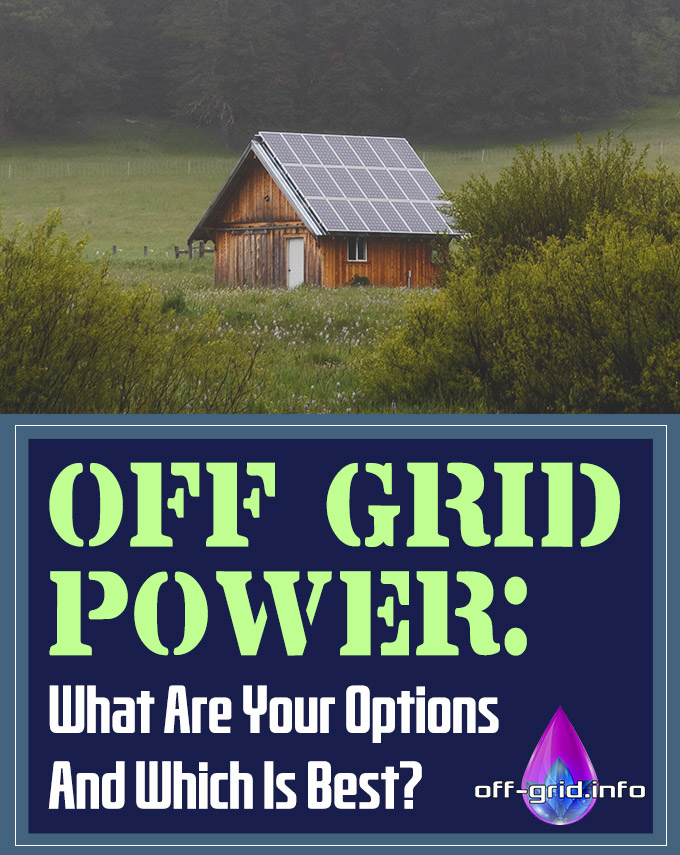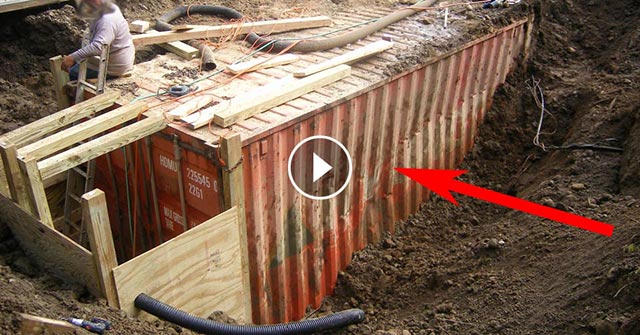Click Here To Join Our Telegram Channel for FREE daily tutorials!

Off Grid Power: What Are Your Options And Which Is Best? – Graphic © off-grid.info. Background photo – Unsplash (PD)
People seek off grid power for several reasons. These are some of the main ones:

1. Living in a remote place away from mains power availability – and need power for communications, light, heat, tools and various other systems.
2. Wanting to save money on electricity bills.
3. Want to do something environmentally friendly.
4. Need or desire a power backup or uninterruptable power supply in case of power blackout.
5. Traveling – perhaps with an RV, ocean going vessel or on a wilderness adventure.
Here’s a list of off-grid power options to consider. Choose the one(s) that best fit your needs and be aware that having more than one power source gives you added resilience.
1. Solar Electricity (Photovoltaic)
Solar in one sense could be said to be the “ultimate” power source – the sun produces vastly more than we could ever possibly use, and it arrives continuously on the earth. On the downside, there may be cloudy days and of course nights, meaning the supply fluctuates considerably.
Solar power is growing rapidly in popularity and experiencing a huge boom. Prices are falling and technologies are getting more efficient, whereas fossil fuels are becoming more expensive and more scarce. Solar power is considered a very “clean” power source (once the systems have been manufactured, which of course generally requires materials and energy which have been derived conventionally!) The setup cost of solar is quite high but maintenance costs are fairly low and of course electricity production is “free”. There may potentially be various forms of government grants or rebates from the government for making this upgrade to their home.
See our database of solar panel manufacturers.

2. Passive Solar
Passive solar is a fascinating power source. It can be used in several ways – for example to create hot water. The most basic example of this is the solar shower – easily obtained at camping stores – which is essentially a durable plastic bag which can be filled with water and left in the sun until hot. The bag has a hose and a tap, and once the water is hot, it is simply hung up and switched on. Another common passive solar system is that used for swimming pool heating. More – Passive solar building design Wikipedia.
3. Concentrated Solar
Through the use of lenses and / or mirrors, sunlight can be “collected” and focused on a small area – producing a tremendous amount of heat and light. The most simple example of this everyone knows from childhood – using a magnifying glass as a home-made “laser” to burn things. Solar concentrators using a parabolic mirror and a glass flask can make an excellent solar kettle for boiling water. Pure sunlight makes an amazing cup of tea! A similar mirror setup is used to create the sun oven.
Another example I saw recently was an astonishing solar foundry which uses a Fresnel Lens in order to generate temperatures of 2100°C. I’m not sure how safe it is (doesn’t look all that safe) but it works.
On a large scale, solar concentrators have experienced a rise in popularity as a means of generating electricity. Through the use of mirror arrays, large areas of sunlight are focused on cells filled with salt. The salt gets so hot that it melts, and is the used as a heat store, from which steam is created to drive turbines.

4. Wind Power
Wind power has both advantages and disadvantages…
1) If there is no wind, you get no power at all – so some locations are far better than others. 2) Wind turbines make noise and the typical designs are often fatal to birds that collide with them – though there are ‘vertical’ designs that birds fly around instead of through. 3) Very scalable – from small low-tech systems through to massive industrial arrays.
See our database of wind turbine manufacturers.
5. Generator
The great advantage of “regular” generators is that they can supply “instant” power on demand, are widely available in size to suit different power requirements, and are generally transportable to where the power is needed. The disadvantages – they are noisy, polluting and require fuel (typically gasoline or propane) which is expensive. Generators make a great emergency power backup system, which is why they are often installed in this capacity.
6. Human Power
I’ve seen this done in true low-tech style with modified “exercise bikes” connected to alternators, which generated power. Another common scenario is “hand cranked” power – such as for flashlights and radios. The hand-cranked radio is immensely popular in Africa in regions without grid power.
7. Geothermal Power
Typically used on a large scale, geothermal power takes advantage of heat within the earth, using it to turn water into steam which is then used to drive turbines and generate electricity. This isn’t really a practical solution for small scale power generation.
8. Micro Hydro
In the good old days, watermills provided a very reliable form of mechanical power. A river was utilized – and a reservoir was created, utilizing a dam with a sluice gate or pipe system – which controlled the flow of water and allowed for an uninterrupted flow of water even in periods of uneven rainfall. Watermills were used to drive various mechanical processes – for example textile manufacture, lumber or stone sawing, or flour production. Watermills have been in use since at least the 3rd century BC. In modern times, watermills can also be used to drive turbines which generate electricity.
There are even “no reservoir” setups where a specially made turbine is placed in an existing river – though to provide a more controllable, less seasonable form of power, reservoir / sluice systems of some kind will be required. One of the great advantages of small-scale hydro is that it is generally considered to have low ecological impact – though careful design is required and depending on your region, there may be environmental regulations to consider – for example if stream levels are affected.
9. Car Engine
I know, I know. It’s not eco-friendly. But a gasoline-powered vehicle is typically also an electrical power source – and it is technically not connected to the grid! A car, of course, generates electricity via the alternator when the engine is running.
I have known people who, when experiencing a grid blackout, were able to keep essential systems going by connecting a small invertor to the car battery and leaving the engine idling. It’s quieter than a generator, and in emergency scenarios is very often the only available power source. I’ve also known people in power blackouts in severe winter conditions who had run out of other fuel for heat and literally kept themselves alive by huddling in the car with the engine running and the heaters on…

This Crazy Off Grid Device Literally Makes Drinkable Water From Fresh Air:
According to NASA, the U.S. is expecting a 100-YEAR LONG MEGADROUGHT.
It's already begun. Ask the farmers in California. They know.
Every survivalist knows that water is of critical importance. You NEED an independent water source that you can count on!
As an interesting "survival rehearsal" - imagine that you turned the tap on right now and nothing came out. How long would you last?
But what if there was another water source literally hidden in plain sight. That's right, I'm talking about the atmosphere!
The amazing thing about getting water from the natural moisture in the air... is that it is ALWAYS available.
This gives you real water security!
Learn more about how to tap into "Nature's secret water reservoir" and stay hydrated when TSHTF!
Watch the video:
😳 What Tinnitus Does To Your Brain Cells (And How To Stop It)
After 47 years of studies and countless brain scans done on more than 2,400 tinnitus patients, scientists at the MIT Institute found that in a shocking 96% of cases, tinnitus was actually shrinking their brain cells.
As it turns out, tinnitus and brain health are strongly linked.
Even more interesting: The reason why top army officials are not deaf after decades of hearing machine guns, bombs going off and helicopter noises…
Is because they are using something called "the wire method", a simple protocol inspired by a classified surgery on deaf people from the 1950s...
Most People Don't Have The Guts To Try This:
An amazing discovery in an abandoned house in Austin, Texas: A lost book of amazing survival knowledge, believed to have been long vanished to history, has been found in a dusty drawer in the house which belonged to a guy named Claude Davis.
Remember... back in those days, there was no electricity... no refrigerators... no law enforcement... and certainly no grocery store or supermarkets... Some of these exceptional skills are hundreds of years of old and they were learned the hard way by the early pioneers.
>> Click here to find out about them now
We've lost to history so much survival knowledge that we've become clueless compared to what our great grandfathers did or built on a daily basis to sustain their families.
Neighbors said that for the last couple of years Claude has tried to unearth and learn the forgotten ways of our great-grandparents and claimed to have found a secret of gargantuan proportions. A secret that he is about to reveal together with 3 old teachings that will change everything you think you know about preparedness:
>> Click Here To Watch The Video <<
What REALLY Happens When You Bury a Shipping Container? (Hint: It's A Bit Crazy...)
Shipping containers are all the rage - but if you are thinking about buying one, you MUST watch this video first:
Do not, I repeat do NOT do what these lunatics did! Can you spot the "fatal mistake" they made?
There's a general belief that if you bury a shipping container you can create an awesome root cellar / storm shelter / survival bunker.
But is a shipping container strong enough to handle the pressure?
Watch the video to see what happens:
What Really Happens When You Bury a Shipping Container? (Click To Watch Video)

I Can't Help Showing This Off:
If you haven't heard of Claude Davis yet do yourself a huge favor and watch this video.
One of the smartest guys I ever had the pleasure of meeting, Claude set-up a unique prepping system that changed his life forever.
I already tried it myself and let me tell... you I was completely blown away... His surprising tactics could make your life easier and give you the peace of mind you deserve.
Don't just take my word for it... watch his short video and decide for yourself.
>> Click Here To Watch The Video <<

More Off-Grid And Survival Resources:












